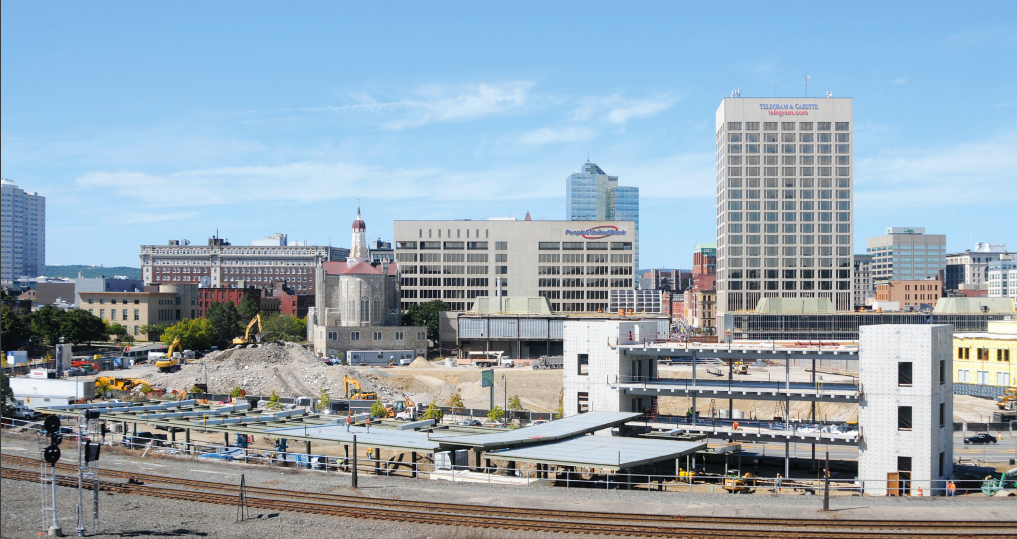
Legislation would spur private investment in Gateway Cities
Gateway City leaders are encouraged by the action the Joint Committee on Economic Development and Emerging Technologies took on Wednesday to extend consideration of House Bill 311, An Act to Promote Transformative Development in Gateway Cities.
With a deadline yesterday in the two-year legislative session that ends this July, the committee had to choose one of three actions for the Gateway Cities bill: report it out of committee, send it to study, or extend it for further consideration. Extending the bill keeps it on the table until the close of a session.
“This bill’s a game changer for Gateway Cities,” said Fitchburg mayor Lisa Wong. “It gives us the toolset we need to take advantage of our assets — great public infrastructure, higher ed and medical centers, and major employers—so that we can be stronger engines for our regional economies.”
Research by MassINC’s Gateway Cities Innovation Institute has shown that low real estate values in the Gateway Cities are a major obstacle to attracting the kinds of private investment these communities need to reposition for a changing economy. House Bill 311 will lower those barriers for projects that have transformative potential.
According to Ben Forman, the Executive Director of MassINC’s Gateway Cities Innovation Institute, “Creating tools to repair weak real estate markets is smart economic development policy. With this legislation, in the near-term, we’ll start to see more cranes in the skylines beyond I-495. “And the transformed spaces constructions workers create will be there to fuel regional economic growth for the long term.”
House Speaker Robert DeLeo has publicly stated that he is looking for ideas on how to spur creation in communities beyond Route 495 for a larger economic development bill he is hoping to pass before the end of this session.
“This bill will provide critical tools to help Gateway Cities reinvest in their economies, so they can create and attract new jobs,” said Rep. Antonio F.D. Cabral (D-New Bedford). “I’m very pleased that the bill is still being considered by the Legislature, and I will continue working with the Innovation Institute, legislators and advocates to get the bill’s proposals passed into law.”
Sponsored by Senator Ben Downing (D-Pittsfield) and Rep. Antonio Cabral (D-New Bedford), this bill provides the tools Gateway City economic development officials have been seeking. Specifically, it:
• Creates a new $125 million Transformative Redevelopment Fund to support commercial development, infrastructure improvements, and safeguards for homebuyers who rehab residential property;
• Expands and improves the state’s existing incentive programs for businesses that sign leases to anchor large-scale revitalization projects; and
• Expands and improves the state’s existing tax credit for the redevelopment of historic properties.
“Our Gateway Cities have so much potential” said Mayor Jon Mitchell of New Bedford. “If we want to get balanced growth in Massachusetts, we need economic development policies that are sensitive to the unique needs and strengths of urban centers beyond Boston.”
“We’ve worked really hard in Holyoke to craft forward-looking revitalization plans,” said Holyoke Mayor Alex Morse. “The tools in this bill will help us make these plans a reality. And when these projects are built, Holyoke will be in a much stronger position to drive growth in the Pioneer Valley economy.”
###
ABOUT THE GATEWAY CITIES INNOVATION INSTITUTE
The Gateway Cities Innovation Institute aims to build and sustain collaborative cross-city, cross-sector efforts to advance a common agenda for Gateway City growth and renewal. The Institute provides independent analysis and a neutral table to help communities coalesce around shared priorities and cooperatively implement bold policy innovation. The Institute is a project of MassINC, a non-partisan think tank and civic organization and the publisher of Commonwealth Magazine.